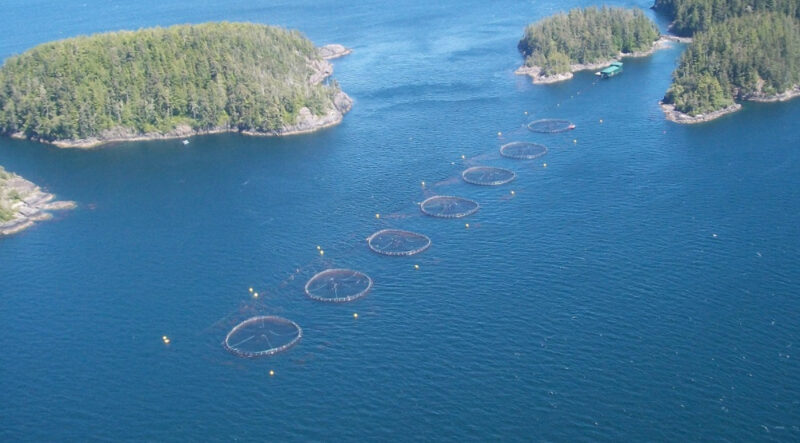First Nations must lead salmon farming in BC
“Working together with First Nations who are interested in aquaculture is essential to our future on the west coast,” said Diane Morrison, BC Salmon Farmers board chair.
By Fabian Dawson
SeaWestNews
First Nations right to self-determination and reconciliation must lead the way to a successful transition plan for salmon farming in British Columbia, states a new report released today.
The new report titled, “BC Salmon Aquaculture Transition: Then & Now”, comes as the Federal Government works with stakeholders to determine what should be included in an open-net pen transition plan for Canada’s West Coast.
Today’s report by the BC Salmon Farmers Association (BCSFA) outlines how the sector’s deep history of innovation supports the federal government’s vision for BC aquaculture, reconciliation, food security, the blue economy, and climate friendly protein production.
“Working together with First Nations who are interested in aquaculture is essential to our future on the west coast,” said Diane Morrison, BCSFA Board Chair and Managing Director of Mowi Canada West.
BC’s salmon farmers said the proposed transition plan by the government, expected this spring, has the potential to create a level of business certainty required for the long-term stability of the sector that generates over $1.2 billion towards the provincial economy and thousands of jobs.
In conjunction with today’s report, BC salmon farmers are urging the government to amend the Fisheries Act to allow for licenses longer than nine years to provide security for significant investment.
They are also pushing for novel licensing initiatives that support the implementation and trialing of innovations and new technologies that further enhance the sector’s environmental performance. Similar to the Norwegian model, this type of license should provide a clear pathway for transitioning from a developmental license to the operating license held by the majority of salmon farming operations.
“Transition is not new to our sector,” said Brian Kingzett, BCSFA executive director.
“Like all farmers, we have been transitioning for decades to adapt to changing conditions. We have been investing in and implementing cutting-edge technologies and innovations to improve our processes, and progressively minimize interactions with the surrounding marine environment, including wild salmon,” he said.
In BC, where fish farmers are under intense attacks by mainly urban-based aquaculture detractors, about 20 BC First Nations have partnership agreements for farming salmon in their territory producing 78% of all salmon farmed in the province.
Salmon farms in B.C. have also started to address the global pressure on supply and demand, which is projected to increase by 40 per cent (almost two million tonnes) by 2027. That upward consumption trend is also reflected in Canada, with Canadians consuming more salmon in their diet than ever before.
“Farm-raised salmon is one of the most climate-friendly foods anywhere in the world,” said the Canadian Aquaculture Industry Alliance (CAIA), adding farmed salmon is critical for Canada’s food security.
Last July, the Federal Government acknowledged that the future of salmon farming in British Columbia will largely depend on First Nations who want the aquaculture operations in their traditional territories.
The Department of Fisheries and Oceans (DFO) is currently undertaking a phased engagement approach with First Nations, the aquaculture sector, B.C. communities, academia, and conservation organizations to provide feedback as to what should be included in an open-net pen transition plan.
As part of the process, BC’s salmon farmers said the transition plan should include the following Fundamental Principles:
- First Nations Right to Self-Determination: The Transition Plan must fully recognize and support Indigenous rights to self-determination and the rights of First Nations to make informed decisions on matters that impact their territories.
- Reconciliation: The Transition Plan must ensure continued opportunity for capacity building within Nations and equitable economic opportunities – as well as establish a framework for enduring long-term relationships.
- Governance: The Transition Plan must include a governance model based upon tripartite agreement (First Nations, federal, and provincial governments) – and provide a robust role in governance and oversight for Indigenous rights holders in whose territories the salmon farms operate.
- Sustainable Sector Growth: The Transition Plan must support the creation of an attractive business environment that signals Canada is committed to advancing growth in sustainable salmon farming in coastal BC. A transition growth plan that builds towards increasing production volumes.
- Alignment with Federal Initiatives: The Transition Plan must support investment into innovative practices and technology, and other federal government priorities, especially the Climate Change Plan and Blue Economy Strategy.
- Trust and Transparency: The Transition Plan must provide clear communication processes and outlets, including engagement opportunities, that will help to foster a better understanding of the industry and create trust and transparency with local First Nations who have aquaculture within their territories, as well as First Nations who have an interest, and the broader Canadian public.
“These principles will ensure we transition in a way that progressively minimizes interactions with wild salmon and be led by the First Nations in whose territories we operate,” said Morrison of the BCSFA.
(BC salmon farm image courtesy of Mowi)

